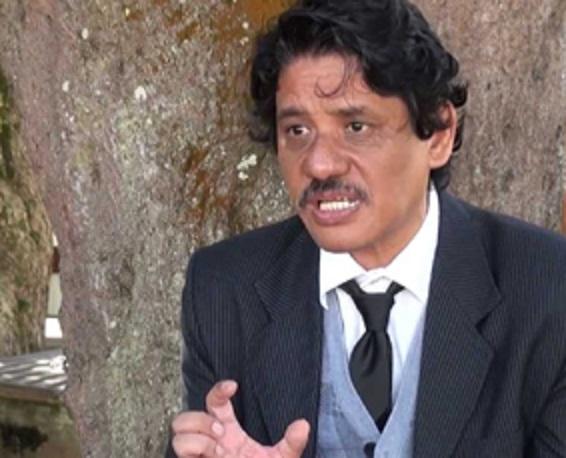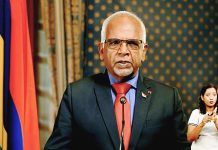Africa-Press – Mauritius. PTr can still bounce back. It will also depend on the outcome of the various investigations and court cases ’ Signs of political instability are growing as rumors of alliances continue to fuel daily conversations.
It is also unfortunate that the cases, some more eloquent than the others, continue to make headlines. Jocelyn Chan Low, historian, tells us about it.
Mauritius Times: We are unfortunately not in the presence of the results of a poll on the popularity of the government at the moment, but it does not seem to be going too well for the Government, but also for the country, with the cases and allegations which follow one another lately, no?
Jocelyn Chan Low: The government’s loss of popularity is very palpable and it would hardly surprise me if a future poll confirms this decline in popularity of the current regime among the population. This fall has been going on for some time now.
This is hardly surprising because the vote of December 2014 was essentially a protest vote against the abuses of the regime of Navin Ramgoolam and a rejection by the electorate of both the PTr and the MMM of a project of alliance perceived as being unnatural.
It was not just a vote of adhesion to parties and leaders of the Lepep Alliance. Without a doubt, some voters believed in the promises of change, especially in good governance, of this alliance which promised to be very close to the people.
But the record so far has fallen short of expectations from both a governance and economic perspective. Mauritians in general abhor any “powerist” drift.
Unfortunately there is a strong perception that the regime in place looks too much like its predecessor: questionable and contested appointments of boyfriends or girlfriends, endless ‘business’ such as the famous ‘bal kuler’, Euro loan or the 19 million, etc .
.
.
In addition, in terms of the economy almost two years after this government took office, we are still at the stage of good intentions waiting to be realized .
.
. Not to mention the internal divisions at the government level which are exposed openly and without restraint in the public square as never before. This gives the image of a disunited government with a leader who is no longer in control.
It is true that the acquittal of Pravind Jugnauth, his return to the Cabinet and his budget which definitively announced a certain rupture, with very laudable measures like the measures for the eradication of poverty, had created the conditions for a renewal in government action.
Unfortunately this has all been marred by recent business ’and events. The ambient gloom that seemed to have vanished for a while is back. * In other times and circumstances, Sir Anerood Jugnauth, as we have known him, would have been quick to subdue the bulls that wreak havoc, be they Minister, Special Advisor or Law Clerk.
Yet he has a comfortable majority, and there does not appear to be any major divergence of views within his alliance on major political or state issues.
So what has changed? It is obvious that SAJ is no longer the old Rambo who did not hesitate, for example, to remove Harish Boodhoo from his post. Some put it on the weight of age.
But the image he projects on television and on public occasions is not that of a man on the brink of breath. Far from there. Rather, he gives the impression of someone who is sure of himself and wants to rule.
What has fundamentally changed is that he is no longer the head of a majority party in Parliament. And, for that, we have to go back to the 2000 Remake.
When SAJ leaves Reduced to return to the political arena, he is no longer at the head of the MSM but, nevertheless, Bérenger presents him as Prime Minister for the first 3 years.
And the Lepep Alliance will present him as PM for the entire term of government. But the power structure as conceived in the West Ministerial system, requires the PM to hold a majority in parliament.
But SAJ today depends on the support of the Lepep alliance parties… He himself confessed to Parliament that he was in favor of the Heritage City project, that it was his project but the leaders of the Lepep alliance being opposed to the project, he had to give in.
Likewise, in the case of Vishnu Luchmeenaraidoo who sought support from Pravind Jugnauth in the war between him and Roshi Bhadain, the PM was unable to take immediate sanctions in a case that looked a lot like a ministerial sling.
. In fact, the real power is dispersed in several poles, one being in the Sun Trust, the other in PMO.
We know that SAJ was very uncomfortable in 1982 in such a situation with a Paul Bérenger controlling the reins of the Party. Of course, it is his son who is the head of MSM where he himself – SAJ – has enormous support.
But still, the situation is far from ideal for the Government to run the country with serenity. * Minister Bhadain seems to have ‘a finger in every pie’: after the termination of the Betamax contract, followed by the BAI episode, the renegotiation of the ‘Double Tax Avoidance Agreement’ with India, etc.
, there was the investigation into the Euro-loan of Vishnu Lutchmeenaraidoo and, most recently, his statement to the Central CID against the ‘Senior Adviser’ of the current Minister of Finance.
“Li is not watching to freeze”, they say, even at the risk of weakening his party colleagues, but this is not done to help maintain the ‘feel-good factor’ that Pravind Jugnauth’s latest budget would have generated, no ?
Obviously, for a while, Roshi Bhadain gave the impression that power gravitated around him and that he had the unwavering support of SAJ. Note that he had solid assets: hardworking, intelligent, dynamic, he is at the head of a Ministry of Good Governance – the description itself is quite a program – besides that he controlled the radio and television.
of the State and that Pravind Jugnauth had to withdraw from the Government. But the sequel is a classic case of “strategic overstretch. ” By attacking Gerard Sanspeur while Pravind Jugnauth has publicly supported him on the Heritage City issue, he has taken one step closer to his political isolation.
And, in politics, a single man is not worth much. * Whether or not it has gotten out of control or there is the risk or even the threat of partial or unpacking, rumored to be, on some files, the minister is retained.
And, it is the Minister of Finance who loses face. It couldn’t last long. What do you think ?
Pravind Jugnauth will have to assert his authority over his troops, at least over the MSM, if he is to position himself as the future prime minister.
Someone who yields to blackmail, to all kinds of pressure comes across as weak, unworthy of running a country as complex as Mauritius. As it is a partial, we know that in Mauritius, in general, it is the regime in place that wins, not to mention that the opposition is “hopelessly divided.
” But politics is also the art of accommodation. For now, Pravind Jugnauth wants to portray a consensus leader, who wants to avoid confrontations. Let’s wait and see.
* A difficult and politically delicate task anyway to handle such situations under the current circumstances for any prime minister, right? Yes. As I just told you, we are in a presidential regime.
In a Westminster-style parliamentary democracy, the Prime Minister is also the clear leader of a party (preferably) or majority alliance in Parliament.
But we must not forget that the most difficult task remains the economic recovery and the beginning of the second economic miracle. SAJ himself has set the bar very high.
For example, the 100,000 jobs that will be created in a few years and this while FDI and private investment are in free fall . . . If there is an economic recovery, the current tensions will quickly dissipate.
Otherwise, we can predict an accentuation of the current mess. Paul Bérenger seems to believe that there is someone in the government who could do better than the old truck.
He maintains that “SAJ is showing cowardice by not assuming its responsibilities”, and adds: “How then to envisage a rapprochement of the MMM with such a PM? “By the way, we just have to follow his gaze to find out where he is going with this: a rapprochement of the MMM would be possible but with Pravind Jugnauth – with whom he spoke last Saturday of a” thaw “in their relations.
Do you think he’s seriously thinking about it? Or is he more looking to “break” MSM? Both explanations are plausible. It is the role of the opposition to try to destabilize the government majority as well as the government to try to destabilize the ranks of the opposition.
It’s fair game. But it is also true that, despite the fact that Bérenger proclaims loud and clear that the MMM will go alone to the general elections, we know very well that since 1983 the MMM has sought to reassure the “Hindi belt” through the game of alliances.
Knowing full well that SAJ will not be taking part in the next generals, it is in the logic of things that Bérenger tries to unfreeze with Pravind Jugnauth.
Likewise, the latter has everything to gain from this thaw. Bérenger’s support is unexpected at a time when he is already positioning himself as the future Prime Minister. In addition, it is obvious that the game will not be easy in the next general election and that he must keep all options open in choosing his allies.
* The question was asked to Jack Bizlall last week, and it is still valid: if Paul Bérenger thinks about it seriously, do you see him able to sell a reconciliation with the MSM to his base, especially after the fishing mishap? to sharks in the murky waters of the PTr-MMM alliance?
It is too early to answer this question. The alliance with the PTr was rejected by activists because of the great unpopularity of Navin Ramgoolam, unpopularity that Berenger himself greatly helped to generate.
Today, Bérenger is careful to spare Pravind Jugnauth and ministers close to him in his criticism of the regime. But all of this is still a matter of speculation.
* If Pravind Jugnauth eventually fails to cope with the crises shaking the government, then he will be tempted to seek a political solution to break the deadlock.
Could a thaw in relations between Paul Bérenger and Pravind Jugnauth eventually lead to something more solid: another Israeli-style deal? What do you think?
Whatever one may say, the game of alliances is the very foundation of political life in Mauritius due to the fact that a party regime characterized by multipartyism coexists with an electoral system of ‘first past the post in 3 member constituencies’ in a more multi-ethnic society.
So an alliance between the MSM and the MMM is always within the realm of the possible. As for an Israeli-style deal, personally I don’t believe it’s still possible under the current circumstances – especially since the Paul-Pravind formula was already rejected by the electorate in 2005.
greatly contributed to the return of Navin Ramgoolam to power. * We do not know at this stage what Pravind Jugnauth will do with his harassment from within his party or the solo political initiatives of his ally, Xavier Duval’s PMSD.
But do you see him able to hold out until the end of the term of the current government? Pravind Jugnauth is SAJ’s runner-up and SAJ has made it clear that he plans to complete his term.
In addition, the MedPoint case is not yet closed as the DPP wants to challenge the Supreme Court ruling before the Privy Council. He will therefore have to be patient.
While the government is experiencing a decline in popularity, it is not yet clear whether the silent majority, the one that makes or breaks governments, has joined the opposition camp.
Too early to know? The opposition is divided and it seems they are failing to capitalize greatly on the woes of the current government. In addition, Navin Ramgoolam has to face several lawsuits in court.
However, there is no mistaking it. In Mauritius, changes of government are very frequent and it is obvious that some supporters who had abandoned either the MMM or the PTr are beginning to return to the fold.
It is quite significant that it is in Triolet that Dr Navin Ramgoolam will organize the PTr congress on September 18th. * In the meantime, we have heard Navin Ramgoolam deny, during this week, any rapprochement with the PMSD, and announce to us the objective of the PTr to stand alone in the next elections.
Is he capable of it? Why not ? The PTr, at one time perceived as a party rooted mainly in rural areas, had, under Navin Ramgoolam, until recently made a significant inroads in urban areas, especially in the capital.
But since the last general election and the events we know, the PTr has been badly shaken. However, he can still bounce back. It will also depend on the outcome of the various investigations and trials in court.
* What about MSM or MMM? Can we predict permutations on the political spectrum?
Frankly, providing for the permutations on the political spectrum in Mauritius is an impossible mission because, until the eve of the general elections, anything is still possible.
Basically, there are no longer any great ideological or even programmatic differences between the mainstream ’parties in Mauritius. There is consensus on the big questions and an acceptance of a soft liberalism which nevertheless gives pride of place to social democratic measures.
On the political spectrum, there is a large center and on the periphery of the fringe parties of the right or the left, the latter having little control over events.
And, in this great center, all alliances and combinations are possible. * In the end, will we come back to a new revival of the political musical flesh ’?
Sure. In politics, and especially in Mauritius, everything is only temporary or cyclical. In fact, there have not been great changes both in structures and in political personnel / dynasties since independence. This is also why political life in Mauritius still has that “déjà vu” air. As a show, we are played over and over again warmed up!
For More News And Analysis About Mauritius Follow Africa-Press







